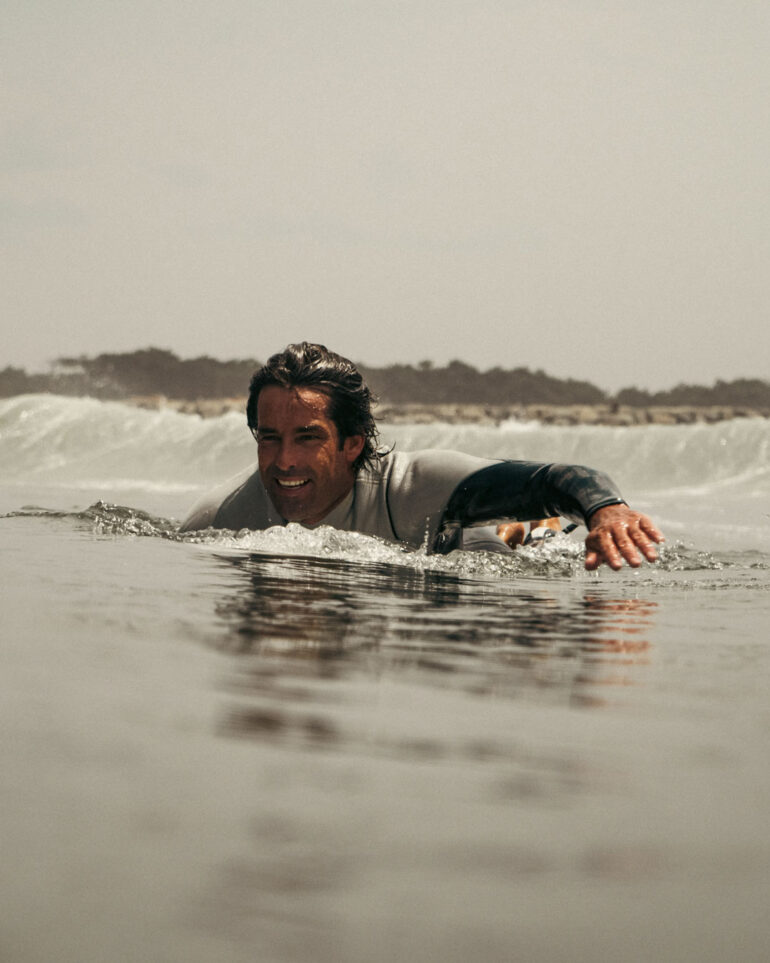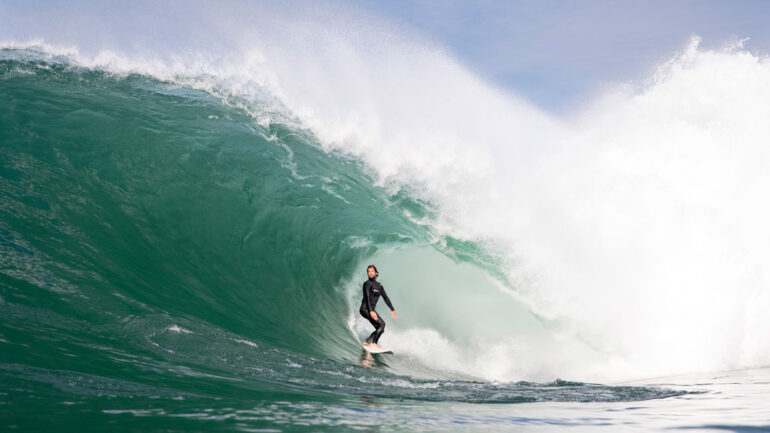instagram.com/joaoguedessurfs
Words: Joana Jervell
Inheriting his passion for surfing from his father, who ensured he grew up surrounded by surfboards and surfing routines, João Guedes found his natural habitat in the sea from an early age. Splitting his time between Porto, Ericeira and Lisbon, he considers himself privileged to be able to turn what he loves most into a profession, which allows him to test his limits, resilience, and ability to surpass himself every day. Involved in a number of projects, always with the sea as a backdrop — whether it’s surfing big waves or piloting jet skis in Nazaré, delivering rescue courses or organising training camps — the truth is that the former national champion can’t imagine spending much time out of the water. For him, surfing is more than a sport; it is a way of life that he admits is “very difficult to give up”. We went to find out why.
Q: How would you describe your relationship with the sea?
A: For me, the sea is something I need to live. I can’t pass much time without going to the sea and I can’t live away from it. I do other related activities besides surfing that mean I’m always at sea, including angling, underwater fishing, diving and more. These activities let me be in the sea even when there are no waves and with the same will as if I were surfing. Apart from all else, I consider the sea to be very therapeutic.
Q: What made you decide to focus on big waves?
A: My love for big waves came naturally. I’ve always been an adrenaline junkie looking to challenge myself, so it was something that was reflected in my surfing from an early age and that has stayed with me to this day.
Q: You’re one of the trainers at Surf & Rescue, which trains surfers as rescuers. What can you tell us about this initiative?
A: Surf & Rescue was something I was invited to take part in as a trainer, an invitation I readily accepted because I identified with it and believed in the importance of this project. It is a partnership between the Association of Surf Schools and the Instituto de Socorros a Náufragos (ISN), through which the ISN teaches us rescue procedures and techniques in the water and basic life support. We, the surfers, are taught surfboard rescue techniques, how to analyse sea conditions and procedures. The programme is open to everyone, and we’re getting more and more participants and great feedback. I’m pleased to see that the project is growing, with excellent prospects for the future.
Q: What’s it like to be a professional surfer in Portugal? What have been the biggest personal challenges in your development? And as a surfer from the north?
A: It’s true, Portugal is one of the best countries for surfing. It’s very consistent, and we have all kinds of waves. I think it is probably one of the best coastlines in the world for surfing, given the length of our coast and the variety of waves we find here.
As a professional surfer, I think the biggest difficulty has always been the fact that we have to leave here in order to develop and all that implies.
In my case, it began with the fact that I’m from Porto, and when I was young I had to regularly travel to the centre of the country for long periods of time because it was, and still is, where everything happens in the sport, from the best waves to the big brands that sponsor us and the largest number of the top surfers. Obviously, these were the first steps towards going further afield, both in competitions and travelling to train, surf different waves and see and surf with better surfers who helped me develop and improve my technical level. It’s undoubtedly a dream life, but it also has its difficulties on a number of levels.
Q: What qualities do you think have been essential to getting you where you are now?
A: I think, as with everything in life, you have to love what you do, and I’ve been lucky enough to turn my hobby and lifestyle into my job. I think surfing has something special about it. It’s more than a sport; it’s a lifestyle and if you’ve grown up with it, it’s hard to give it up, so of course you do all you can to keep at it.
Q: Where in Portugal do you prefer to surf?
A: I love surfing in the north of the country, but I moved to Ericeira when I was quite young, both to be more central and because it is where some of the best waves were, which are the ones I like surfing the most. As well as Ericeira, Nazaré has become a regular spot for its big waves and in between the two, there is Peniche where I spend a lot of time.
Q: How do you see the new generation of big-wave surfers on the national scene?
A: We’ve always had some respectable big riders, but it’s only recently that attention has turned to big wave surfing. With this development and the prominence of the sport, some talent has emerged that is starting to stand out on the international scene. There’s no doubt that Nazaré is a great school that is beginning to bear fruit.
Q: You were in the cast of the HBO series 100 Foot Wave. Tell us a little about that experience.
A: 100 Foot Wave is an HBO series that tells the story of the evolution of big wave surfing in Nazaré, how it has appeared to the world and everything that has happened during the winter seasons.
I’m taking part in the series as a surfer, although for the last few years, I’ve also been working as a jet ski pilot for the cameraman who shoots all the action in the water. It’s a job that involves a lot of risk and requires good knowledge of the sea and the waves, as you’re always in the place where the waves are breaking, trying to capture the best surfing moments of each session.
Q: As you know, surfing is synonymous with travel. Name a destination you want to keep going back to? What about the trip you haven’t yet made?
A: Considering how many times I’ve been to Indonesia and never got tired of it, I think it’s still my number one destination. Apart from Indonesia, there are other places I’d like to go back to that I really miss.
I’d also like to go to Tahiti, not just for the place, but for the waves — and one in particular. I want to go there while I’m still able to surf, and I hope I get the chance.
Q: Is there a wave or a moment at sea that you will never forget?
A: I have several and from different places. Sometimes it’s not just one wave, but a series of factors that define a surf or a wave. I have great memories from Porto to Nazaré, Ericeira, Madeira, Indonesia, Namibia, Australia, Cape Verde, Hawaii, the Maldives and more… Whenever I try to remember one in particular, all these places come to mind and it’s hard to choose.
Q: What is the biggest lesson surfing has taught you so far?
A: I think surfing, like any other sport, demands a lot from you and your willpower.
I think that surfing in particular forces us to have a special resilience, starting with the search for the best waves and conditions, often overcoming the cold and unpleasant conditions, added to the fact that every time we enter the water or finish a wave, we have to overcome the sea to get back out and still find the best waves, which are not always easy to find. That, along with a few other factors, is the day-to-day life of a surfer. So yes, I think resilience is one of the virtues I’ve learned the most from surfing, with the others perhaps being respect and humility.
Q: Where can you usually be found when you’re not in the water?
A: Now I think of it, it’s very difficult to find me not doing something at sea because I’m a person who always likes to be doing something, especially something I enjoy. But I recently became a father, and I feel that this experience has added the missing piece and made me run to my son whenever I can. It’s been unbelievable and without doubt the biggest drop of my life.




